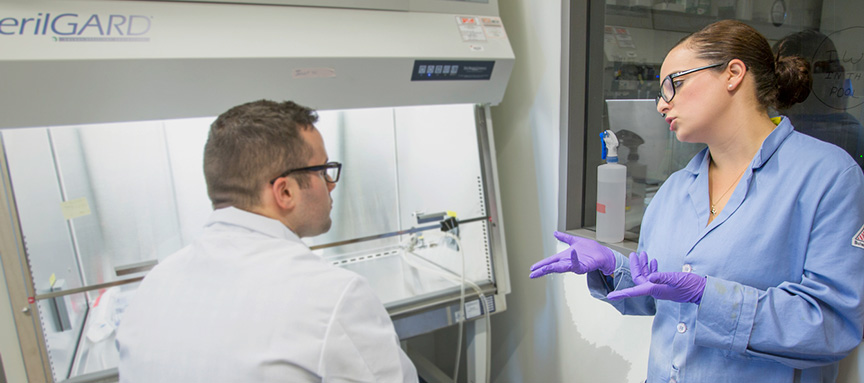Faculty Perspective: David
Leading by example: Women do great science in great programs
[[ PAGE BANNER: see the home page instructions for adding new images. Image should be 864 pixels wide by any height. ]]

An interview with Yael David
Q
A
Can you tell me about your academic background?
I was born and raised in Israel and after completing two years of army service I started my undergrad at Tel Aviv University. Because undergraduate degrees in Israel are a little bit more theoretical, and since my parents had relocated to the US a few years earlier, I decided to move to Stony Brook University, which is a more research-oriented institution. It was an opportunity to explore a new environment and do hands-on science. I performed undergraduate research in a hardcore neuroscience lab, doing the surgeries myself, dissecting frogs and doing electrophysiology, and I loved it. But I found myself drawn to the molecular aspect of it; in every physiological question I encountered, I always looked for the biochemical principle behind it. My focus was on AMPA receptors and how they affect neurotransmission. I used molecular methods such as cysteine scans to dissect the role that a specific segment plays in opening the channel upon stimulation. My fascination with the mechanism was the hint that I was destined to do things at a higher resolution. After graduating from Stony Brook I moved back to Israel for graduate school at the Weizmann Institute. I decided I’d do one rotation in biochemistry just to develop a few skills in the field, but I fell in love with biochemistry. Within a week I knew that was what I was going to do for the rest of my life. After I completed my PhD, I looked for a postdoc in a lab that will allow me to do something really interdisciplinary and decided to take a very sharp turn into peptide chemistry in Tom Muir’s lab at Princeton.
Q
A
What is it like to be a woman in science?
Being a female sometimes can get a little tricky but it makes success even more rewarding when you achieve it. I think women are just as capable as men and I am happy to see the environment changing towards having more female faculty, but I think the problem is at the earlier stages; I would say the transition from PhD to postdoc is the hardest. If you look at the percentages of women doing science in undergrad and grad school it is almost 50:50. But then in the transition to postdoc the percentage of women drops, especially in the chemical sciences. I do think there is a conscious effort to enable women to do great science in great programs such as TPCB. My department chair, Derek Tan, for example, is highly committed to giving equal opportunities to females at every level—graduate, postdoc and faculty—and has been leading by example. I also try to lead by example; for me, seeing other successful female scientists was very inspiring so I try to inspire other females to pursue scientific careers.
Q
A
As a new lab head, what do you tell students about the benefits of joining the Yael David Lab?
Since we are a new lab, it is still relatively small, which I think has a huge benefit for graduate students. The attention and mentoring you get in a small lab is very important for your academic growth. It lays a strong scientific foundation and provides you the confidence to become an independent scientist. I think it’s easy to be drawn to the big labs, because they have the history and the publications, but many times you will not have much mentoring from your PI and have to rely on senior graduate students and postdocs. I work with my students, or as I call it “stay in the trenches” with them. If you come to my lab, I will personally mentor you: show you how to think and design experiments and how to execute them. I will show you how to interpret the results and design the next experiment based on the conclusions. I think that this type of nurturing is very important for getting a really solid foundation for your academic future. Certainly, this type of training, which I received as a graduate student, made me the scientist I am today.
Q
A
What do you tell students about the work being done in your lab?
Well, first of all I tell them that we work in a very exciting time where interdisciplinary methods can really be harnessed towards understanding complex biological questions. Moreover, applying this on epigenetics, which is a very up and coming field, is extremely powerful. These technologies allow us to ask fundamental questions about causality in events that control gene regulation. Specifically, I am very excited about looking at how changes in the cells’ microenvironment translate to changes in the transcriptional program through chromatin modifications. It is something that is generally difficult to study because the tools are so scarce. There are now methods, some of which I personally developed in my postdoc, such as semisynthesis of modified histones using protein trans-splicing in live cells, that allow us to precisely control these modifications. These methods open the door to interrogating causality, which is very tricky in a field like epigenetics, where so much of the information is correlative. These methods require expertise in a variety of fields: chemistry, biochemistry, cell biology and more. I believe we should, and can, do all these in-house. So students in my lab will synthesize peptides and proteins, apply those to ask biochemical questions and eventually deliver them into live cells and even animals, to test their physiological effects. So they’ll acquire a whole range of skills. But it’s not just about knowing the techniques, they will also learn how to think about science on different scales—chemical, biochemical, and cellular.
Q
A
How does it feel to start your own lab?
A dream come true. I was one of those annoying kids that used to dream about becoming a professor from a very young age. Every step of the way was aimed towards becoming a research scientist. I think you should always be passionate about what you do, and I go to work everyday excited about what the day entails. Personally, I have no doubt that Sloan Kettering is the best place to do the kind of research I want to do. The accessibility to people who lead their fields is just amazing; I can step out of my office and talk to the world’s experts in almost anything. And for someone who spans several fields this is very important. Also, the support from the institutution is just incredible. You can feel that they want you to succeed just as much as you do, whether it is by providing the best resources, facilities, intellectual support, or mentoring. I also think that being a part of the TPCB is a huge perk.


